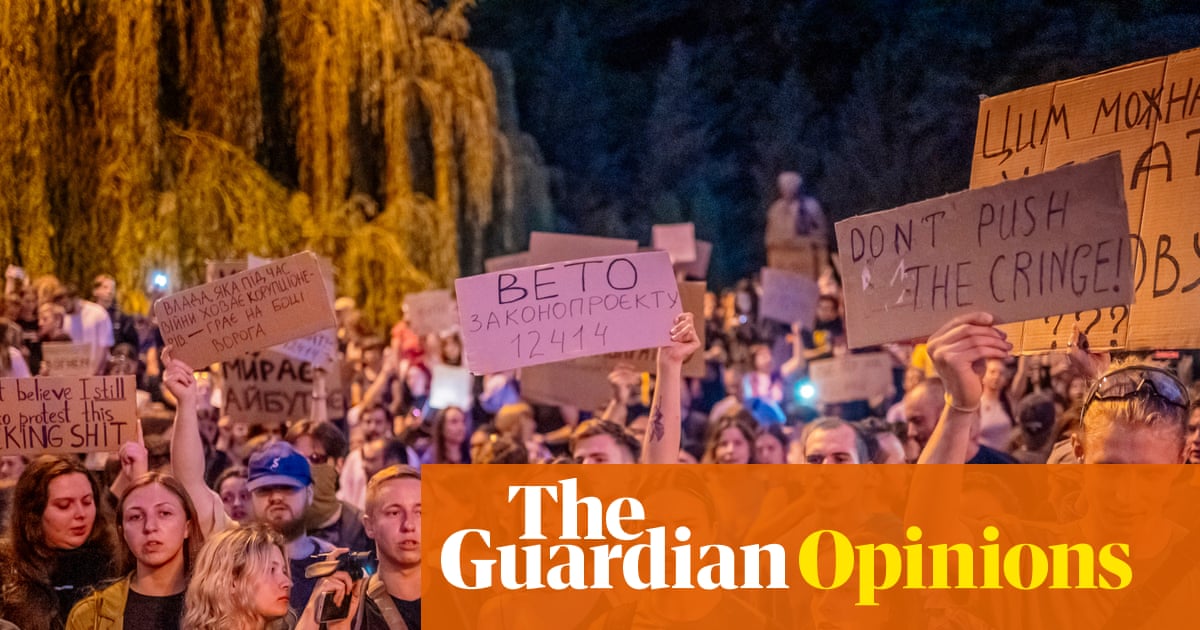For quite some time, foreign colleagues have been asking me about Ukraine’s democracy during wartime. Often these questions assume that political freedoms vanish by default in a country at war. They ask whether protests or critiques of the government are even possible.
Ukraine is a democracy at war – and democracy itself is an existential matter. It is precisely what the country is fighting for. My usual answer has been: “The people will know when it’s time to protest.” They will sense when too much power is being concentrated in security services, when parliament’s role is being bypassed, when the prime minister or members of parliament are no longer acting independently. Ukrainians, I would say, will know when red lines are crossed.
This week, many decided that such a red line had been crossed.
On Tuesday thousands of people gathered in Kyiv to protest and call on Volodymyr Zelenskyy to veto legislation they believe undermines the independence of two key anti-corruption institutions: the national anti-corruption bureau of Ukraine (Nabu) and the specialised anti-corruption prosecutor’s office (Sapo).
The protest was largely youthful – many would have been kids during the 2014 Revolution of Dignity. Their chants included “Veto the law!” and “No to pressure on independent institutions”. Despite martial law, only two policemen were stationed nearby. The atmosphere was even cheerful. It was by far the largest protest since Russia’s full-scale invasion in February 2022. Similar demonstrations took place in approximately 10 Ukrainian towns.
And yet late that very night, Zelenskyy signed the bill into law.
What shocked many was not just the content of the legislation but also the speed and manner in which it was pushed through: passed within a day, as an amendment hidden inside unrelated law enforcement reforms, and then signed and published almost immediately.
Since the beginning of Russia’s invasion, Ukrainians have demonstrated an extraordinary level of unity and civic responsibility. Citizens also showed renewed faith in the institutions of the state – even those long viewed with suspicion. People were willing to look past imperfections, to suspend criticism, and to focus on survival and victory. That is why there has been no serious internal push for wartime elections, despite foreign commentary. Elections – expensive, risky and constitutionally prohibited during war – are widely understood by Ukrainians to be unfeasible under current conditions. But this is different.
This law has become a litmus test of whether public trust in the government can be sustained. And more than that, whether the unwritten social contract – between citizens and the state – still holds.
The law adopted by Ukraine’s parliament – formally known as draft law 12414 – includes sweeping changes that fundamentally alter the authority of Ukraine’s anti-corruption bodies. The prosecutor general now holds expanded powers over Nabu and Sapo – including control over investigations, case access and team composition, and the authority to shut down cases or transfer them to other law enforcement bodies.
The vote took place just one day after the security service of Ukraine (SBU) conducted searches at Nabu’s offices, and Ukraine’s state bureau of investigation (SBI) filed criminal charges against three Nabu employees over car accidents that occurred in 2021 and 2023. These incidents raised eyebrows for their timing.
According to Nabu, the new provisions “effectively destroy the independence of Sapo and place both Nabu and Sapo under the control of the prosecutor general”. The bureau reminded lawmakers that Ukraine’s anti-corruption infrastructure, built in partnership with international allies since 2015, was a key precondition for western financial and political support.
As institutions, Nabu and Sapo are not without flaws. Government representatives – both formally and off the record – have raised concerns about politicised investigations, poor coordination with other law enforcement agencies and even alleged infiltration by individuals sympathetic to Russian interests. The quality of investigations has also been criticised. Some probes have dragged on for years without result. Others, including cases against prominent business figures or former officials, have been accused of selective prosecution. There are also persistent rumours that Nabu investigations have touched individuals close to Zelenskyy himself.
What makes this even more complex is that these institutions are tied to Ukraine’s commitments for EU membership. And yet European integration – while deeply valued by Ukrainians – is no longer something the EU itself appears eager to actively advance. That makes it even easier for outside partners to use moments like this to distance themselves, to quietly say: “Maybe Ukraine isn’t ready after all.”
But the deeper issue is this: none of Ukraine’s law enforcement institutions are ideal – not during wartime, and arguably not before it. But Nabu and Sapo remain the most trusted parts of a law enforcement system long plagued by corruption and impunity. They were created not to be dismantled when they become inconvenient. The protesters are not defending a fantasy of flawless institutions but the principle that reform must not be replaced by control.
Protests are likely to continue. The government will have to respond. Yes, there is war. But in a democracy there is a constitutional way forward: the law can be rescinded, amended, debated transparently. This cannot be fixed by one late-night briefing from the head of the security service or the newly appointed prosecutor general – nor by a photo opportunity where Zelenskyy stands alongside the heads of all law enforcement bodies. It requires real, public consultation.
The demonstrators in Kyiv this week are sending a message. If there were questions about what the limits of government power during war should be, they were answered on Tuesday.
